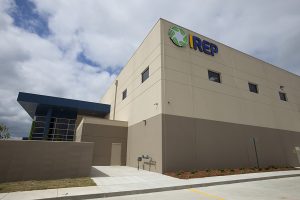 A shuttered mixed-waste MRF has been sold to the city of Montgomery, Ala., and multiple companies are interested in running the facility either as a traditional MRF or mixed-waste plant.
A shuttered mixed-waste MRF has been sold to the city of Montgomery, Ala., and multiple companies are interested in running the facility either as a traditional MRF or mixed-waste plant.
The former Infinitus Renewable Energy Park (IREP) opened in 2014 but closed in 2015 and has sat vacant ever since. A company official cited commodity prices and lower-than-expected material volumes as significant hurdles that forced its closure. Since the shutdown, all of the city’s recyclables have been going to landfill.
IREP Montgomery-MRF LLC filed for bankruptcy in 2016, and the proceedings have been moving along since then.
The city of Montgomery, as the largest creditor in the bankruptcy case, will take possession of the processing plant for a fraction of its value. For the facility that was built for $35 million, the city paid a price of $625,000 plus $320,000 to settle fees and tax issues, the Montgomery Advertiser reported.
The city paid the balance so it could receive the title for the facility and continue negotiating with potential operators, said Barry Crabb, finance director for the city.
“We have found some people that are coming to see us in the next few weeks to talk about what they’d like to do,” Crabb said in an interview with Resource Recycling.
More than 30 potential operators have talked with the city about running the facility, Crabb said. Out of all the inquiries, three companies expressed confidence they could viably operate the plant.
Mixed-waste rekindling
According to Crabb, one of the companies would restart the plant as a mixed-waste MRF, collecting garbage and recycling mixed together and separating out the commodities at the facility. That model did not pencil out for IREP, but a few factors could work in favor of the next operator.
Crabb did not disclose the name of the company interested in running the operation as a mixed-waste facility.
Although commodity prices likely had an impact on IREP’s inability to run the plant economically, a larger problem was the company lacking an outlet for a substantial portion of its products, Crabb said. IREP leaders had talked about achieving diversion rates of 75 percent and higher but were never able to make that happen.
Roughly 20 percent of the material IREP was receiving was separated as recyclables, Crabb said, and much of the remainder had to be sent for landfill disposal.
“They never could find a market for the compost, which was about 50 percent of what they were able to pull out,” he explained.
But the current interested operator has another option for that material. The company has discussed adding up to $5 million of additional equipment that would convert the organics into a fuel source, Crabb noted. It would be a low-grade fuel, Crabb explained, and the potential operator has a cement kiln that’s interested in it.
The ability to convert some of the non-saleable material into fuel was missing from the IREP operation, Crabb said.
“That’s one thing they kept talking about, they couldn’t get an investor to do it,” he said. “This group does have that.”
Facility conversion
Meanwhile, two other potential operators have expressed interest in running the Montgomery facility as a standard single- or dual-stream MRF. Both entities operate paper mills and have stated they would not need the facility to be a self-contained profit generator, Crabb explained. Instead, the MRF’s value would come from helping to guarantee fiber feedstock for manufacturing.
One of the potential operators is particularly interested in Montgomery’s commercial recycling opportunities, Crabb noted. The city has a large automotive sector, with a Hyundai manufacturing plant and multiple automotive suppliers. The MRF operator has said there may be tremendous potential in commercial recycling, which could offset the tough economics of residential recycling.
However the facility operates in the future, it will have to pencil out without subsidy, beyond the city providing the site and equipment.
“We’re happy to turn that over to an operator, but that’s really the only financial commitment we can make,” Crabb said. “What we can’t do is pay additional tipping fees in order to help it operate.”
Ideally, he said, the city will know which direction it will take in the next couple months.
More stories about MRFs
- CurbWaste targets growth amid multi-million funding round
- New MRF guide aims to boost infrastructure
- Federal Recycling expands Denver operations



